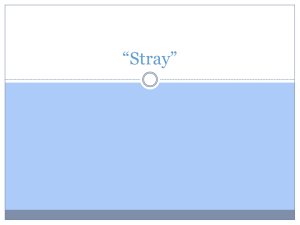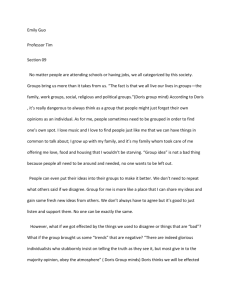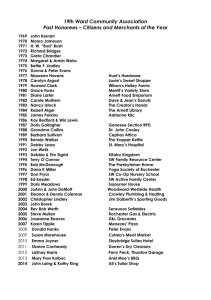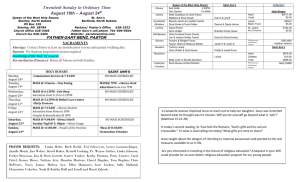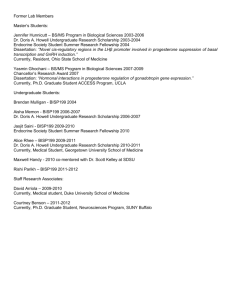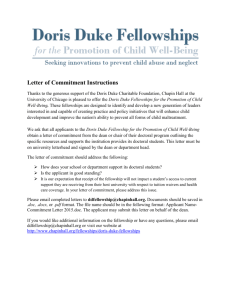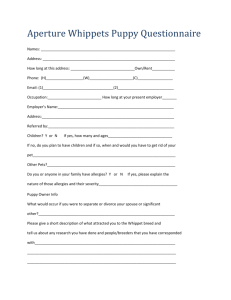Stray by Cynthia Rylant
advertisement
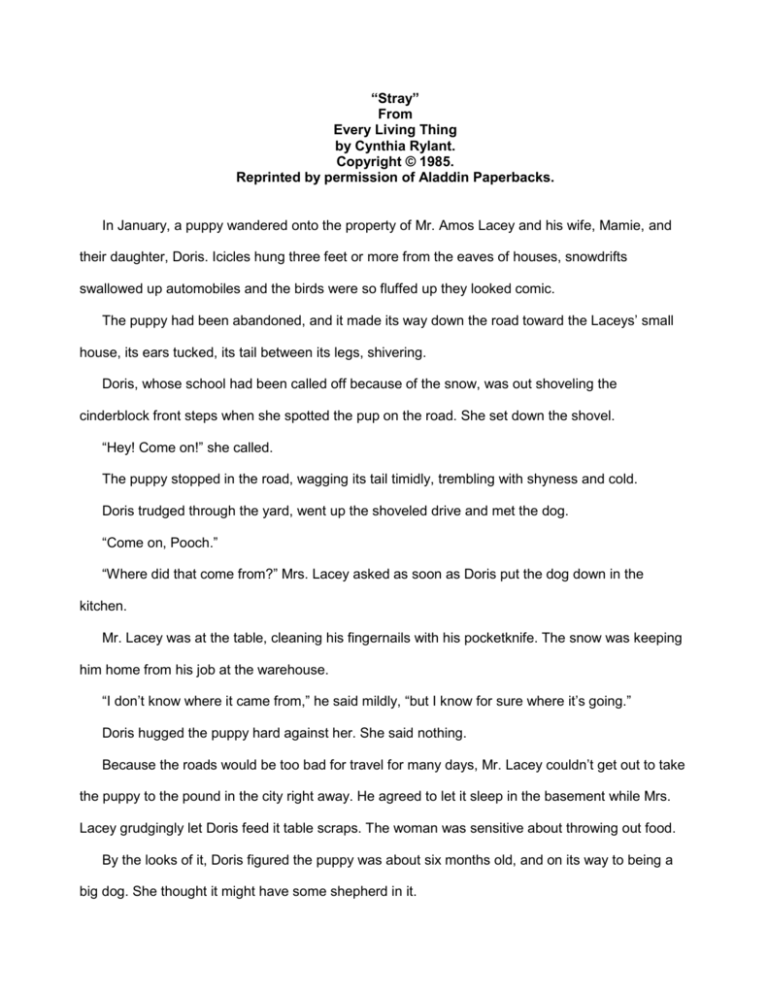
“Stray” From Every Living Thing by Cynthia Rylant. Copyright © 1985. Reprinted by permission of Aladdin Paperbacks. In January, a puppy wandered onto the property of Mr. Amos Lacey and his wife, Mamie, and their daughter, Doris. Icicles hung three feet or more from the eaves of houses, snowdrifts swallowed up automobiles and the birds were so fluffed up they looked comic. The puppy had been abandoned, and it made its way down the road toward the Laceys’ small house, its ears tucked, its tail between its legs, shivering. Doris, whose school had been called off because of the snow, was out shoveling the cinderblock front steps when she spotted the pup on the road. She set down the shovel. “Hey! Come on!” she called. The puppy stopped in the road, wagging its tail timidly, trembling with shyness and cold. Doris trudged through the yard, went up the shoveled drive and met the dog. “Come on, Pooch.” “Where did that come from?” Mrs. Lacey asked as soon as Doris put the dog down in the kitchen. Mr. Lacey was at the table, cleaning his fingernails with his pocketknife. The snow was keeping him home from his job at the warehouse. “I don’t know where it came from,” he said mildly, “but I know for sure where it’s going.” Doris hugged the puppy hard against her. She said nothing. Because the roads would be too bad for travel for many days, Mr. Lacey couldn’t get out to take the puppy to the pound in the city right away. He agreed to let it sleep in the basement while Mrs. Lacey grudgingly let Doris feed it table scraps. The woman was sensitive about throwing out food. By the looks of it, Doris figured the puppy was about six months old, and on its way to being a big dog. She thought it might have some shepherd in it. Four days passed and the puppy did not complain. It never cried in the night or howled at the wind. It didn’t tear up everything in the basement. It wouldn’t even follow Doris up the basement steps unless it was invited. It was a good dog. Several times Doris had opened the door in the kitchen that led to the basement and the puppy had been there, all stretched out, on the top step. Doris knew it had wanted some company and that it had lain against the door, listening to the talk in the kitchen, smelling the food, being a part of things. It always wagged its tail, eyes all sleepy, when she found it there. Even after a week had gone by, Doris didn’t name the dog. She knew her parents wouldn’t let her keep it, that her father made so little money any pets were out of the question, and that the pup would definitely go to the pound when the weather cleared. Still, she tried talking to them about the dog at dinner one night. “She’s a good dog, isn’t she?” Doris said, hoping one of them would agree with her. Her parents glanced at each other and went on eating. “She’s not much trouble,” Doris added. “I like her.” She smiled at them, but they continued to ignore her. “I figure she’s real smart,” Doris said to her mother. “I could teach her things.” Mrs. Lacey just shook her head and stuffed a forkful of sweet potato in her mouth. Doris fell silent, praying the weather would never clear. But on Saturday, nine days after the dog had arrived, the sun was shining and the roads were plowed. Mr. Lacey opened up the trunk of his car and came into the house. Doris was sitting alone in the living room, hugging a pillow and rocking back and forth on the edge of a chair. She was trying not to cry but she was not strong enough. Her face was wet and red, her eyes full of distress. Mrs. Lacey looked into the room from the doorway. “Mama,” Doris said in a small voice. “Please.” Mrs. Lacey shook her head, “You know we can’t afford a dog, Doris. You try to act more grownup about this.” Doris pressed her face into the pillow. Outside, she heard the trunk of the car slam shut, one of the doors open and close. The old engine cough and choke and finally start up. “Daddy,” she whispered. “Please.” She heard the car travel down the road, and, though it was early afternoon, she could do nothing but go to her bed. She cried herself to sleep, and her dreams were full of searching and searching for things lost. It was nearly night when she finally woke up. Lying there, like stone, still exhausted, she wondered if she would ever in her life have anything. She stared at the wall for a while. But she started feeling hungry, and she knew she’d have to make herself get out of bed and eat some dinner. She wanted not to go into the kitchen, past the basement door. She wanted not to face her parents. But she rose up heavily. Her parents were sitting at the table, dinner over, drinking coffee. They looked at her when she came in, but she kept her head down. No one spoke. Doris made herself a glass of powdered milk and drank it all down. Then she picked up a cold biscuit and started out of the room. “You’d better feed that mutt before it dies of starvation,” Mr. Lacey said. Doris turned around. “What?” “I said, you’d better feed your dog. I figure it’s looking for you.” Doris put her hand to her mouth. “You didn’t take her?” she asked. “Oh, I took her all right.” her father answered. “Worst looking place I’ve ever seen. Ten dogs to a cage. Smell was enough to knock you down. And they give an animal six days to live. Then they kill it with some kind of a shot.” Doris stared at her father. “l wouldn’t leave an ant in that place,” he said. “So I brought the dog back.” Mrs. Lacey was smiling at him and shaking her head as if she would never, ever, understand him. Mr. Lacey sipped his coffee. “Well,” he said, “are you going to feed it or not?”
